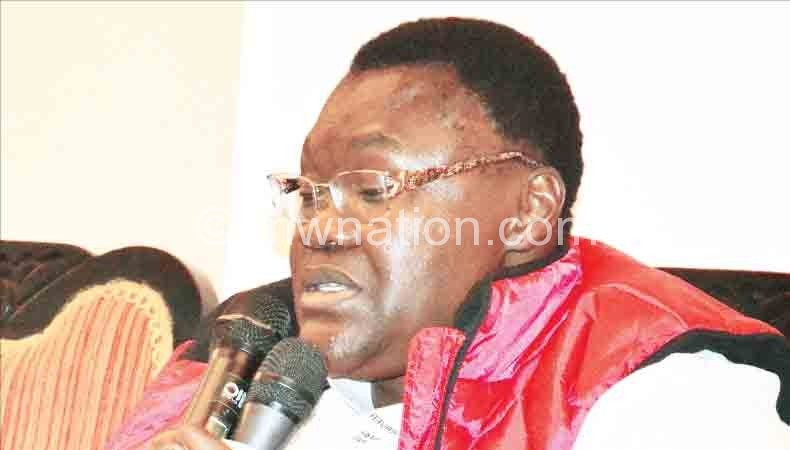No need for new laws, NGOs tell APM
President Peter Mutharika’s announcement that government would introduce a law to govern cultural practices has not received the support of non-governmental organisations (NGOs) who argue that the country does not need the laws.
The President, in an interview with the British Broadcasting Corporation (BBC) last week, said government would table a Bill later this year to safeguard the lives of the vulnerable, mostly women and children, who are exploited through cultural practices.

His announcement to the world came at a time when the country has attracted worldwide condemnation for the existence of such cultural practices.
Eric Aniva, who brought the issue to light when he told BBC that community members in Nsanje pay him to carry out cleansing rituals involving young girls and widows, was initially charged with defilement contrary to Section 138 of the Penal Code but this was changed to engaging in harmful practices contrary to Section 5 (1) of the Gender Equality Act.
But Women and Law in Southern Africa (Wlsa) Malawi has argued that the Gender Equality Act of 2013 clearly prohibits committing, engaging in or subjecting another person to a harmful cultural practice.
States Section 5 (2) of the Act: “Any person who contravenes this Section commits an offence and is liable to a fine of K1 million and five years imprisonment.”
In an interview yesterday, Wlsa Malawi national director Mzati Mbeko said what is needed is for government to implement the laws which already exist in reacting to the Aniva development than enacting new laws through legislative processes that can be protracted.
He said: “We have adequate legal framework to curb these practices. For instance, we have the Gender Equality Act whose Section 5 outlaws harmful practices and so does Section 80 of the Child Care Protection and Justice Act. The Penal Code could also be handy to curb these practices.”
Section 80 of the Child Care, Protection and Justice Act enacted in 2012 states that no person shall subject a child to a social or customary practice that is harmful to the health or general development of the child.

The harmful cultural practices outlined in sections 81 and 82 include forced marriage or forced betrothal, using a child as surety for a debt or mortgage (kupimbira common in Karonga),
The same Child Care, Protection and Justice Act warns community members to report to Police or social welfare if there are reasonable grounds to believe that a child (defined as aged 16 and below) is being physically, psychologically or emotionally injured, abandoned, or exposed, or is sexually abused.
But Mbeko conceded that the provisions fell short of outlining the harmful cultural practices and arresting people for practising them could be tantamount to ambushing citizens.
He said these laws and more were not being implemented because they are too entrenched in the culture.
Following the BBC report, the United Nations in Malawi has also condemned the ritual cleansing ceremonies, describing them as a violation of the rights of the girl child with immediate and long-term psycho-social, physical, biological and health impacts.
However, the UN also acknowledged that harmful cultural practices are criminalised in the Gender Equality Act and the Child Care, Justice and Protection Act.
NGO-Gender Coordinating Network (NGO-GCN), a network of organisations working on gender equality and was instrumental in the formation of the Prevention of Domestic Violence Act, has also said the country has the laws to fight such cultural practices but implementation was lacking.
“I wouldn’t say yes or no whether we need a new law but it is without a doubt that the laws are there. The Marriage Act has qualified child marriages as a harmful cultural practice which some communities saw as normal,” NGO-GCN chairperson Emma Kaliya said.
She agreed with Mbeko that the government should consider isolating specific practices and clearly describe them as illegal just as Kenya did with Female Genital Mutilation (FGM).
Adding his voice to the debate, Chancellor College associate professor of law Edge Kanyongolo said having passed the Gender Equality Act outlawing such practices, they should have been eliminated through enforcement.
He told The Nation last week that the government should avoid selective application of the laws specifically against harmful practices which have existed and impinge on the rights of women and children contrary to legislations such as Gender Equality Act and Child Care, Protection and Justice Act.
He said the President, having mentioned these specific legislations, should have instituted comprehensive action.
“Let’s go on an exercise to eliminate all of them [harmful cultural practices]. What has happened could amount to selective prosecution. Let’s attack kusasa fumbi and all of them than just focusing on one thing just because BBC has covered it,” he said.
However, while the Malawi Law Commission does not have such a law on its annual work plan this year, it has submitted a report on the proposed HIV legislation which has outlined the harmful cultural practices which aggravate the vulnerability of women and girls to HIV and Aids.
According to the draft HIV Bill, there are 18 harmful practices listed in the first schedule among them chimwanamaye, hlazi, chijura mphinga, Kuchotsa fumbi, Chiharo, Kuika mwana kumalo, Kujura nthowa, Mwana akule and Kupondera guwa.
Presidential press secretary Mgeme Kalilani said yesterday he needed more time to consult the President on the reaction while Minister of Justice and Constitutional Affairs Samuel Tembenu could be drawn to comment after earlier indicating that he would respond later in the afternoon.





